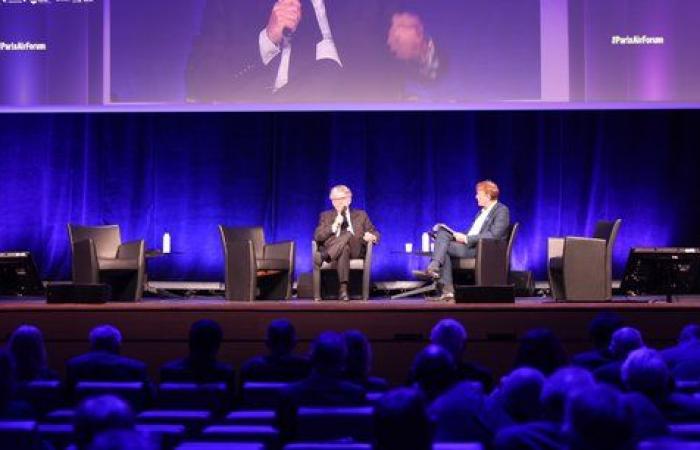LA TRIBUNE – Will the European results, with the breakthrough of the far right, significantly change the situation at European level?
THIERRY BRETON – Overall, the balances in the European Parliament will change very little. We have a distorted prism in France, but this is not the case in Parliament. We are seeing a very slight surge from the far right, but in translation of the seat, the balance at the level of Parliament will be relatively preserved, with three major government and coalition parties, which are the EPP, the conservative party, who gain a few seats, Renew who loses around twenty, and the social democrats who are practically stable. The question will be whether or not the Greens will have to make an alliance.
You are Commissioner for the Internal Market, but also Commissioner for Defense Industries. What does that mean ?
I am Commissioner for defense industries, internal markets and all digital, telecommunications and even media activities. Defense industries are part of the commission’s prerogatives, but not defense itself. We must stop making people believe the opposite. Many have used this “ quibble » during the European elections. Defense stricto sensu is in the hands of States and it will remain so, however what can be coordinated are the defense industries.
Europe will produce as many shells as Russia by 2025, assures Thierry Breton
If there is one point of consensus, it is the need for Europe to rearm itself in the current geopolitical context. What initiative have you, as Commissioner for Defense Industries, taken?
To begin with, we did not wait for the war in Ukraine to strengthen our defense. We got off to a strong start with the European Defense Fund [adopté en 2021, ndlr]. This is the first time that Europe has acquired the capacity to invest in research and development on a significant number of defense programs, ranging from hypersonic missiles to the aircraft of the future.
The second part was the need to rearm our industrial defense apparatus, to meet the immediate needs of Ukraine but also of the Member States which had emptied their stocks of ammunition, in particular the large caliber 155 shells. As a result, we increased extraordinarily accelerated our ability to produce munitions. We have thus moved from a manufacturing capacity of 500,000 shells per year to more than 1 million in less than a year in January.
We obtained, in the European Parliament and the European Council, the vote for a program called ASAP (Action to support the production of munitions, editor’s note) which gave the possibility of benefiting from 500 million euros for go and finance a certain number of factories upstream to make these munitions. We will have a production capacity of 1.7 million at the end of the year and more than 2 million next year. The goal is to reach 2.5 million. I think we should be there around the turn of 2025.
Despite everything, when it comes to defense, Europe has a capacity and time problem. In this context, we are implementing the EDIP (European Defense Industry Program), requested by the European Council and which will really help change the situation in terms of production capacity. We are going to propose a mechanism identical to that of the United States with strategic stocks which will be managed by the States.
These three threats hovering over the defense industry
Estonian Prime Minister Kaja Kallas spoke of a 100 billion euro fund for European defense, is this realistic?
We support the initiative of the Estonian Prime Minister. The war is still there, the consequences are still there, the need to increase our production capacities is more present than ever. When we are in Estonia, I say it sincerely: society is potentially preparing for a conflict, even if it has not waited until today. And this is the case for everyone who has a common border with Russia.
For our part, we identified the same amount as the Estonian Prime Minister, with the need to have a fund of 100 billion. Half to finance precisely the upgrade of the defense industrial apparatus and the other to finance common infrastructures in what are called contested spaces.
As a reminder, the Vice-President of the European Commission, Josep Borell, worked with defense ministers for the first time in our institutional history, and they created a defense white paper. It contains our common vision in terms of defense and defines four contested spaces: space, maritime, cyber, and air. For these four spaces, the need expressed by the 27 defense ministers is to come together to protect these contested spaces.
Has the objective of sovereignty been achieved, while 55% of arms imports by European countries come from the United States over the period 2019-2023 compared to 35% over the period 2014-2018?
It is a problem. This shows a need to increase our defense purchases, all sectors combined. And this for three reasons: to provide Ukraine with what it needs to defend itself, including missiles. But also replenish our exhausted stocks. Finally, achieve that all NATO members spend at least 2% of their GDP in their defense budget, which is an absolute necessity for the members of the Atlantic Alliance, and very few have succeeded.
The ability to be ready, that is to say for European industry to supply on time, is now an absolutely major element of our sovereignty, our security, and even our deterrence which is not than nuclear.
Our quality sites are there but they are under-exploited compared to what they may have been decades ago. They need to be upgraded. Our objective is to be able to move to less than 50% external dependence for our own needs 2030-2035.
Defense: AI, already essential on the battlefields
Shall we towards a new, more integrated European defense? Are we going to see the emergence of a great “Defense Airbus”?
Defense is, remains, and will remain a prerogative of the Member States. And that’s good like that. The armies will obviously remain in the sole control of the Member States. Anyone who tries to say something else is not telling the truth.
Our project is to bring together resources, cooperation, common and shared infrastructures. I talked in particular about what we need in contested spaces. We are already doing this with Galileo, for example, which is our constellation, which allows us to have extremely sophisticated satellite positioning, for military and defense applications.
We have more and more integration in terms of interoperability, controls, harmonizing our equipment, working together to develop and deliver these. But I don’t think we will see a European army in our lifetime.
Concerning the European constellation project, do you have the green light to launch the Iris² Constellation? Do you have the necessary money and have the manufacturers entered the envelope?
We are in the final so-called “procurement” phase. But we are on schedule. The manufacturers are perfectly aware of my objectives, so I have every confidence that we will meet the schedule.
Thierry Breton, the architect of European space policy who was able to impose the IRIS constellation
In space, the launch of Ariane 6 takes place on July 9, but Europe is late in its sovereignty in space matters. Is she doing enough? Is there enough solidarity, particularly between France and Germany?
We welcome this first launch which we are impatiently awaiting. We had problems with Ariane 6 and with Vega-C, which are being resolved. It is essential that Europe has sovereign access to space. I can tell you that we have a lot of orders planned, and a lot of satellites to send for our sovereignty.
Space Europe: imminent takeoff for Ariane 6 (July 9)
Particularly in terms of space exploration, Europe is lagging behind the United States, China and Russia, particularly in the conquest of the Moon or Mars. Why does Europe not have a policy of strategic autonomy in these areas?
Everything has a time. I’m a space fanatic, but I really think that our priority was to give ourselves the elements of our sovereignty in the world as it is. And sovereignty is access to space, these are our constellations. This is what allows us to control, protect, secure all the spaces for which we are responsible and in particular space in general. Once we achieve that, we can focus on space exploration.
In terms of artificial intelligence, Faced with a world that could become irresponsible, how do we protect ourselves from a shift in the control of machines over humans?
We have put rules and red lines in the way of using artificial intelligence thanks to the AI Act which was passed by our co-legislators, by the Parliament and by the European Council. For this regulation, we spent a lot of time analyzing everything. Discussions between the three institutions lasted 38 hours straight. This is the longest trilogue in the history of the European Union. Now we have rules for everyone who wants to operate in Europe.
For Thales CEO, “AI is a source of vulnerability”
Obviously, the whole subject now is to have more globalized rules, as we have done, for example, on the subjects of proliferation, and in particular nuclear proliferation. And we Europeans will arrive at the negotiating table with already a vision and tools.






